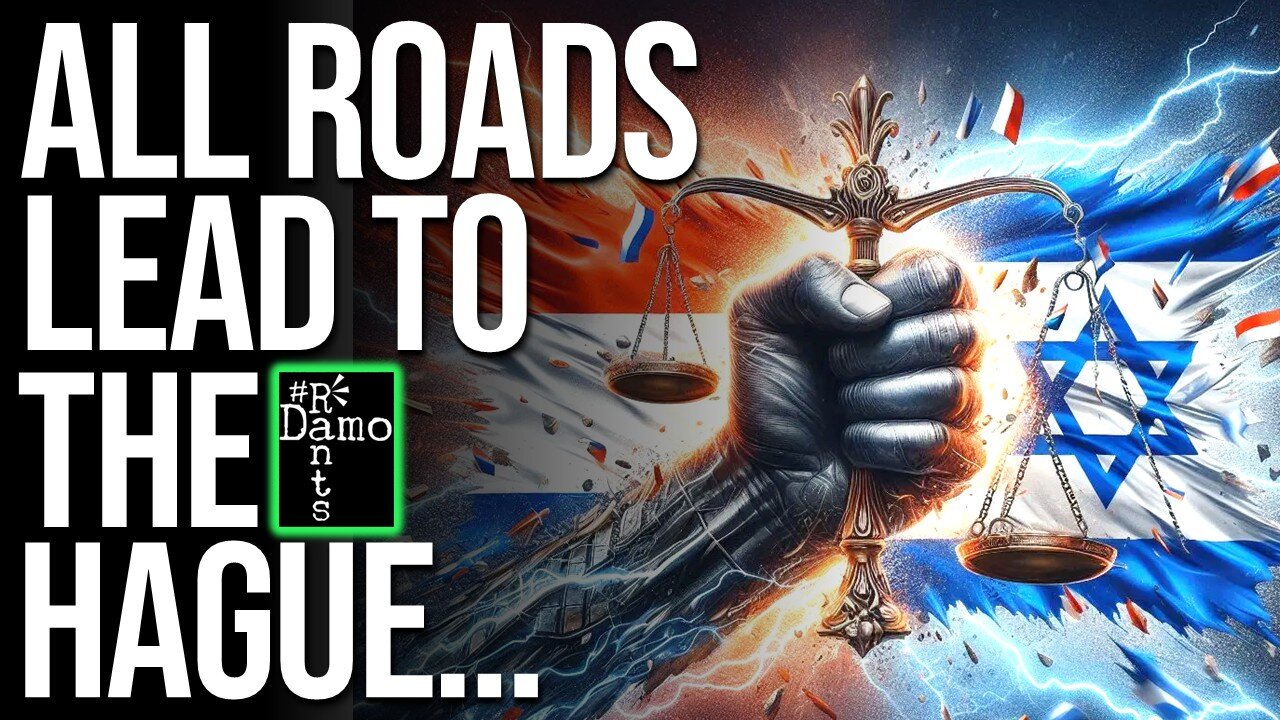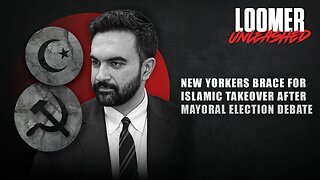Premium Only Content

Another European Ally Just Snapped – And Israel’s Panicking
Right, so for far too many years, Israel has enjoyed diplomatic immunity so thick it could deflect war crimes charges with a raised eyebrow and a Hasbara press release. But earlier this month, the Netherlands took an extraordinary step that has had Israeli sphincters clenching. In a move without precedent in its postwar history, the Dutch government has officially declared the State of Israel a national security threat. This remarkable assessment, issued by the Dutch National Coordinator for Security and Counterterrorism (NCTV), named Israel as a hostile foreign actor engaged in disinformation campaigns and political interference, and accused it of attempting to undermine international justice institutions, including the International Criminal Court (ICC) in The Hague.
Not only is this move completely unprecedented; it carries potentially global ramifications now that the precedent has ben set. For over seventy years, Israel has enjoyed a privileged position in Western foreign policy—a state immune from the same classifications and criticisms typically directed at geopolitical rivals such as Russia, China, or Iran, we have seen Israel made an exception of time after time. But with this designation, the Netherlands has taken a decisive stand: that no state, however historically favoured, is exempt from scrutiny or accountability when its actions pose a threat to democratic values and international legal institutions. This Dutch classification of Israel is not only justified but is massively overdue and is another nail in the coffin for Israel’s global immunity from international law and no amount of Hasbara is going to get them out of this.
Right, so the NCTV report titled "Assessment of Threats from State Actors," released earlier this month, identified several countries—including Russia and China—as predictable sources of espionage and cyber interference. But it was the inclusion of Israel that drew international attention and diplomatic backlash. The report cited two principal areas of concern. First, the NCTV accused Israel of engaging in disinformation and foreign influence operations inside the Netherlands, bypassing diplomatic protocols and targeting Dutch political and media institutions. Second, and even more seriously, it accused Israel of attempting to obstruct or paralyse the functioning of the ICC, where high-ranking Israeli officials—including Prime Minister Benjamin Netanyahu and the Former Defence Minister Yoav Gallant—face arrest warrants for war crimes in Gaza.
One of the most revealing examples involved a document circulated by Israel's Ministry of Diaspora Affairs. In the aftermath of riots following the controversial Ajax vs Maccabi Tel Aviv football match in Amsterdam in November of last year, the Ministry reportedly distributed an unofficial document to selected Dutch politicians and journalists. According to investigations reported by Ynet News and corroborated by Press TV and the Palestine Chronicle, the document contained detailed commentary on antisemitic incidents but was laced with politically inflammatory content. Dutch authorities noted with alarm that it included personal information about Dutch citizens and appeared to be part of a broader effort to shape public discourse on Israel and antisemitism, not through diplomacy but via covert influence operations.
In a country with a strong tradition of press freedom and political neutrality, the backlash was immediate and its been intense. The Dutch intelligence community interpreted the document not as a good-faith warning about antisemitism, but as a foreign attempt to manipulate political dialogue and discredit civil society groups critical of Israel. The fact that it was distributed through unofficial channels only deepened suspicion, suggesting a deliberate attempt to avoid oversight and provoke political anxiety. The NCTV concluded that such activities bore the hallmarks of state-sponsored disinformation, putting Israel in the same category as states already sanctioned for similar tactics.
The Dutch concerns were not limited to domestic politics either. Perhaps the most significant charge was Israel’s behaviour toward the International Criminal Court. The NCTV cited mounting evidence that Israel, along with its close ally the United States, had escalated efforts to intimidate, discredit, and sabotage the ICC in response to its ongoing investigations into Israeli war crimes in Gaza. The implications of this are profound. The ICC, headquartered in The Hague, in the Netherlands, is not just a court—it is a cornerstone of the international legal order. For the Netherlands, whose identity as a state is closely tied to hosting institutions like the ICC and the International Court of Justice (ICJ), any interference with these bodies is not simply an international concern; it is a matter of national sovereignty.
Israeli hostility toward the ICC is well documented. Over the past decade, Israel has repeatedly denounced the Court as biased and illegitimate, arguing that it lacks jurisdiction over Israeli nationals. These denials have been accompanied by more aggressive measures. As documented by multiple sources including The Skwawkbox, and The Cradle, Israeli intelligence agencies have reportedly surveilled ICC officials, pressured third-party states not to cooperate with the Court, and even threatened legal retaliation against judges. When arrest warrants were issued against Netanyahu and Gallant, these threats intensified. For the Dutch government, which has a legal and ethical responsibility to safeguard the independence of international institutions on its soil, Israel’s actions crossed a red line.
The report’s release has triggered international reverberations. Israel has categorically denied the accusations, labelling them antisemitic and politically motivated because of course they have. However, the Dutch government has stood firm, and its allies within the EU have so far remained cautiously supportive. More significantly, the designation is beginning to shift the discourse within European political circles. Countries such as Ireland, Spain, and Belgium, already vocal critics of Israel’s military actions in Gaza, are now considering whether to adopt similar assessments or reassess their diplomatic frameworks.
The Netherlands' decision follows a broader pattern of distancing and disillusionment between the European Union and Israel. Earlier this year, the Dutch government imposed tighter controls on the export of military and dual-use goods to Israel, citing concerns over their use in human rights violations. As Reuters reported at the time, the decision reflected a growing recognition within the Dutch and European policy communities that trade and security cooperation with Israel could no longer be considered risk-free or apolitical.
Adding to this momentum was the Dutch foreign minister’s public call in May of this year for a formal EU review of the EU-Israel Association Agreement. This trade and cooperation pact includes a human rights clause that Israel has in the view of a great many of us by this point, repeatedly violated. As The Business and Human Rights Resource centre has noted, the minister described Israel’s blockade of humanitarian aid to Gaza as "catastrophic," suggesting it may constitute a breach of international humanitarian law. The security designation, therefore, should be seen not as a standalone judgment but as the culmination of a long and increasingly uncomfortable evolution in Dutch-Israeli relations.
While the designation may be grounded in national security, it also represents a larger moral and legal argument: that democratic states must not allow historical allegiances, ideological affinity, or diplomatic expediency to override their responsibility to protect democratic institutions, international law, and the principle of accountability. For decades, Israel has benefitted from what can only be described as a moral exceptionalism—a belief, particularly in Western capitals, that it must be shielded from the kind of scrutiny applied to other states. The Dutch have now called time on that illusion.
To understand the full scope of this shift, it is worth asking what led to such a belated but decisive reckoning. Part of the answer lies in Israel’s own conduct. The ongoing war in Gaza, now in its 21st month, has shocked the global conscience. With over 58,000 Palestinians dead, thousands more displaced, and aid convoys bombed or blocked, the international community is running out of diplomatic euphemisms. The ICC’s issuance of arrest warrants for top Israeli leaders marked a turning point. So too did the growing civil society backlash in Europe, including mass protests, legal petitions, and a cascade of boycotts by universities, unions, and civic groups.
But another part of the answer lies in the internal dynamics of Western democracies. As states like the Netherlands grapple with foreign interference, misinformation, and the erosion of public trust, their tolerance for double standards is diminishing. If they are to defend democratic sovereignty against Russia or China, they must also do so against allies who also breach the same norms. By naming Israel, the Netherlands has reasserted a principle that has too often been disregarded: that no state has the right to subvert another’s democracy in pursuit of impunity.
The consequences of this decision are already unfolding as Israel spits the dummy and chucks its toys out of the pram. They may retaliate diplomatically, downgrade intelligence sharing, or accuse the Netherlands of enabling antisemitism even – well they never do that do they?! But it is unlikely that these tactics will reverse Dutch policy. In fact, they may accelerate the shift instead, because the propaganda, the Hasbara and the weaponisation of anti-Jewish racism no longer cut through like they once did. Civil society groups across Europe are already citing the NCTV report as a basis for renewed calls to suspend the EU-Israel trade agreement and expand universal jurisdiction claims against Israeli officials.
Equally significant is the impact on international institutions. The ICC, long beleaguered by accusations of bias and weakness, may find in the Dutch decision a new source of legitimacy. If the host nation is willing to defend its independence and identify threats to its operation, then the ICC is no longer isolated. It is now politically defended by at least one state willing to challenge the impunity of its adversaries.
There is a historical irony here. The Netherlands, a country whose identity is steeped in the postwar liberal order, is now leading the charge against one of that order’s most privileged beneficiaries. In doing so, it is not betraying Western values but reaffirming them. It is saying that democracy means nothing without accountability, that international law cannot function if judges are threatened, and that human rights cannot be selectively applied.
In the end, the Dutch designation of Israel as a national security threat is not simply a policy change. It is a political and moral statement—one that will reverberate I hope far beyond The Hague. It invites other states to reconsider their assumptions, examine their complicity, and decide whether they are willing to defend the principles they so often preach. And if not, they’re going to look even more weak and compromised than perhaps they already do. For Israel though, it is an all new moment of reckoning when they simply aren’t used to having international law applied to them as it always should have done.
It isn’t just in the Netherlands that such action is taking place, as I covered yesterday, Belgium has just made European history in its courts too by taking on Israel on a whole other front the details of which can be found in this video recommendation here as your suggested next watch.
Please do also hit like, share and subscribe if you haven’t done so already so as to ensure you don’t miss out on all new daily content as well as spreading the word and helping to support the channel at the same time which is very much appreciated, holding power to account for ordinary working class people and I will hopefully catch you on the next vid. Cheers folks.
-
 LIVE
LIVE
Laura Loomer
4 hours agoEP150: New Yorkers Brace For Islamic Takeover After Mayoral Election Debate
2,752 watching -
 LIVE
LIVE
Man in America
8 hours agoThe Forbidden Medicine of Light: Why is Big Pharma HIDING This From Us?
968 watching -
 LIVE
LIVE
BlackDiamondGunsandGear
1 hour agoAFTER HOURS ARMORY / Marine Gun Builder RETURNS!!
61 watching -

Damysus Gaming
2 hours agoARC Raiders - SERVER SLAM TIME!!!! LFG!!!
2.98K -
 1:04:10
1:04:10
The Connect: With Johnny Mitchell
5 hours ago $0.76 earnedTucker Carlson's INSANE Take On Civil War In America, Calls For Fascism
2.42K7 -
 LIVE
LIVE
DLDAfterDark
3 hours agoThe Return of Marine Gun Builder? MGB, DLD, BDG&G After Hours Armory
106 watching -
 28:39
28:39
Afshin Rattansi's Going Underground
1 day agoDonald Trump’s Gaza Peace Plan: A Pivotal Moment or Farce? (Palestinian Deputy Foreign Minister)
12K5 -
 3:31:29
3:31:29
SavageJayGatsby
4 hours ago🔥 Spicy Saturday – Let's Play: Prison Life 2🔥
20.5K1 -
 4:34:18
4:34:18
cosmicvandenim
10 hours agoCOSMIC VAN DENIM | WARZONE HORROR
3.03K1 -
 29:09
29:09
Stephen Gardner
8 hours ago🚨Trump DECLARES WAR on TERRORIST LEFT!
19.1K39